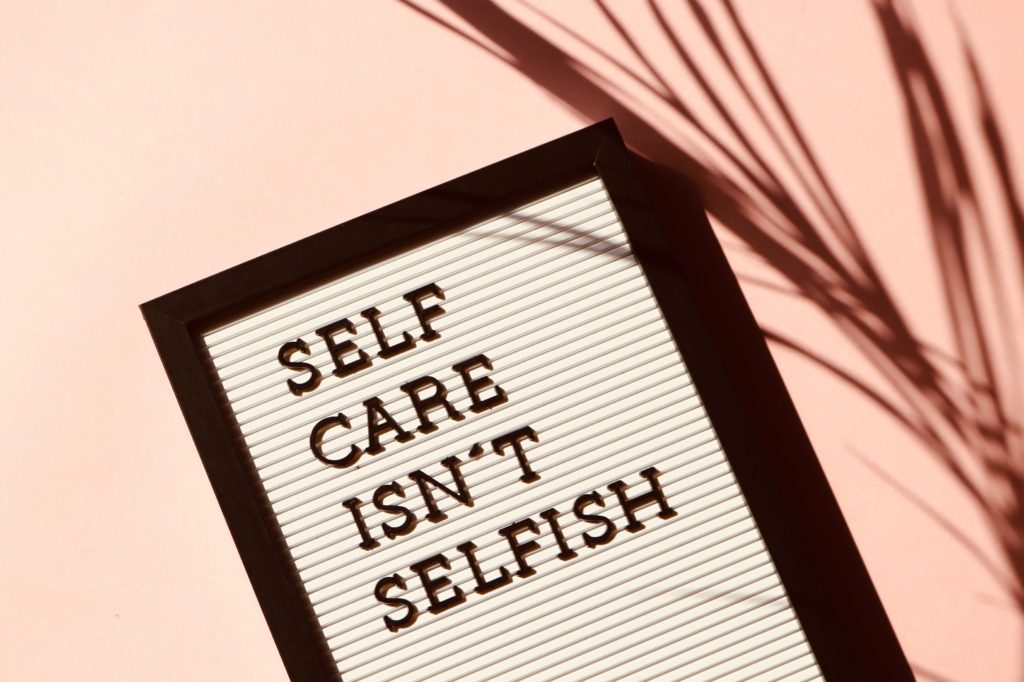6 Min Read
Self Care Tips for Caretakers
For many caregivers, providing care can be physically and emotionally stressful. When taking care of another person, caregivers often put others’ needs before their own. Caregivers sacrifice a significant amount of time, energy, and individual physical and emotional needs, which can lead to caregiver stress, burnout, and other mental health problems. This speaks to the importance of self-care for caretakers.

Caretaker’s Mental Health
Whether you’re in the profession of caregiving or taking care of a loved one, it’s essential to recharge your batteries. For family members, caregiving can lead to additional pressures, such as family conflicts, social withdrawal, and financial strains. Over time, higher levels of stress can lead to burnout, a condition marked by irritability, sleeping problems, feelings of hopelessness, and social isolation.
Caregiver burnout is an example of how chronic stress harms your mental and physical state. Chronic stress triggers the release of stress hormones, which can lead to exhaustion, irritability, a weakened immune system, digestive issues, pains, and headaches.
Caretakers also face increased risk factors for depression and substance abuse. Caregiving can be an emotional rollercoaster. While caring for your family member or close friend can be an enriching experience, continuous caregiving responsibilities can contribute to higher stress levels. According to the Anxiety and Depression Association of America, 40%–70% of caregivers in the United States show symptoms of depression. Approximately one-quarter to half of these caregivers meet the diagnostic criteria for major depression.
Caregivers are more likely to have a chronic illness than non-caregivers, especially high cholesterol, high blood pressure, heart disease, and the tendency to be overweight.
Signs and Symptoms of Mental Health Problems
When ignored, chronic stress can take a significant toll on your physical and mental health, relationships, and state of mind. Understanding and recognizing the signs and symptoms of caretaker mental health problems can prevent the situation from worsening.
Common signs of caregiver stress include:
- Anxiety, depression, or irritability
- Feeling exhausted or fatigued
- Sleeping problems
- Overreacting to minor problems
- New or worsening health problems
- Difficulty concentrating or paying attention
- Feelings of resentment
- Substance abuse or overeating
- Ignoring caretaker responsibilities
Over time, too much stress can lead to burnout, mental illness, health problems, and psychiatric problems. Common signs of caregiver burnout include:
- Having significantly less energy than you had before
- Feeling constantly sick
- Feeling exhausted, even after waking up or taking time off
- Neglecting your own needs, either because you don’t have time or you don’t care
- Feeling like your life is centered around caregiving
- Difficulty relaxing, even when caregiving help is offered
- Increasing irritability for the person you’re caring for
- Feelings of helplessness and hopelessness
Self-Care Tips for Caretakers
Whether you’re taking care of a family member or close friend, it’s reasonable to experience caregiver stress. Establishing a self-care plan might seem impossible when you’re putting so much of your time and energy into taking care of your loved one. According to the National Alliance on Mental Illness, self-care can ultimately make you stronger and more resilient.
As many of us know, the first rule on an airplane is putting your oxygen mask before helping anyone else. As a caretaker, taking care of yourself isn’t a luxury—it’s a priority. Prioritizing your individual needs is just as important as making sure your loved one gets to their doctor’s appointment or takes their medication on time.
With that in mind, here are the best self-care tips to help you become a better caregiver.

Find a Therapist for Your Mental Health as a Caretaker
Get personalized matchesPrioritize your health.
Ignoring your physical health can add to the stress of being a caregiver. Setting aside some time to take care of your health can help you become a better caregiver.
- Go to your doctor’s appointments. It’s easy to ignore your health when you’re busy taking care of a loved one. Don’t skip check-ups or appointments with your healthcare providers—remember that you need to be healthy to take good care of your loved one.
- Get enough sleep. Many caregivers have a hard time getting a good night’s sleep or sleeping without worrying. Not getting enough sleep can lead to poor decisions. Prioritizing sleep is essential to providing better care for your loved one.
- Start exercising. Physical activity not only helps you maintain your physical health, but it can also improve your mental health. Caregivers often feel like they don’t have enough time for regular exercise because they put others’ needs before their own. Being creative with your workout—for example, by taking the stairs or parking further away in a parking lot—can help you fit physical activity into a busy schedule. Although your challenges won’t disappear entirely during your workout, you might find your challenges a little more manageable.
- Eat a balanced diet. Eating fresh fruit, vegetables, lean protein, and healthy fats can boost your mood and give you more energy.
- Practice relaxation techniques. A daily meditation practice can help you clear your mind and relieve stress. Yoga, deep breathing, or mindfulness meditation can help you combat stress and feel more centered.
Give yourself a break.
As a caretaker, leisure time might seem like a luxury. But you owe it to yourself—and your loved ones—to carve breaks into your busy schedule. Give yourself permission to rest and practice self-care regularly.
- Take time off for yourself. Taking care of your own physical and mental health will help you fight caregiver burnout and take better care of your loved one. Keep going to appointments with your healthcare providers and maintaining other personal commitments. Set aside time for things you enjoy, like reading a good book or taking a bubble bath regularly. Taking a few minutes for yourself each day can help you recharge, improve your mental state, and provide proper care. You might feel selfish for taking time for yourself, but this small change can help you and your loved ones in the long run.
- Forgive yourself. Primary caregivers often blame themselves for everything that happens to their loved one, which is especially true for family caregivers of individuals with mental health conditions or chronic diseases. It’s easy to question every mistake you’ve made—from losing your temper to saying something you regret. Permit yourself to forgive yourself, and remember that making mistakes is part of being a caregiver.
- Allow yourself to feel. Caretakers often condition themselves to set aside their own emotions and do what needs to be done for their loved ones. Eventually, ignoring your emotional health will catch up to you. Caretakers can feel a wide range of emotions from anger and sadness to stress and grief at any given moment. Instead of suppressing negative emotions, permit yourself to feel them. Until you deal with your feelings, they’ll likely continue to resurface.
- Find balance. Finding balance in your personal life can feel impossible as a caretaker. On your own and with your loved one, set boundaries regarding how you can and cannot help. Setting boundaries is the best way to control your life, prioritize your emotional needs, and maintain a healthy relationship with your loved one. It can also help your loved one take a proactive approach toward their health. As you set boundaries, it’s common to feel guilty. However, there’s nothing wrong with putting your own needs first.
- Ask for help. Don’t expect friends or family to know you’re struggling automatically. Speak up if you need help and don’t be afraid to spread the responsibility of caregiving among other family members.
Don’t be afraid to seek support.
Social support is a great way to share your struggles and combat feelings of stress. If friends and family members aren’t available, online support groups and professional help are available.
- Join a support group. Although it can be difficult to maintain healthy relationships with friends and family members as caregivers, it’s important to foster significant relationships to fight isolation and burnout. Realizing you’re not alone and that others are going through similar experiences can help you become more self-compassionate. Many hospitals and local organizations offer caregiver support groups for primary caretakers, informal caregivers, and family caregivers. It can also be helpful to connect with caretakers on social media.
- Seek professional help. It’s easy to vent to your family member or best friend about your worries and struggles as a caretaker. But friends and family members aren’t always available to help—physically or emotionally. Therapists, social workers, and mental health providers can help you become more aware of your emotional health, feel supported, and find the answers to questions you may have while caregiving.
How to Find Help
Whether you’re struggling with chronic stress, mental illness, or negative feelings, talking to someone who is trained to provide guidance as you navigate everyday challenges can help you stay healthy and strong.
To find a mental health provider, consider reaching out to a mental health professional on the WithTherapy platform. WithTherapy’s unique service will match you with mental health professionals you feel comfortable with, regardless of your personal preferences and requirements. One of our qualified mental health professionals can help you improve your emotional state, become a better caretaker, and live your best life.
Find a Therapist for Your Mental Health as a Caretaker




